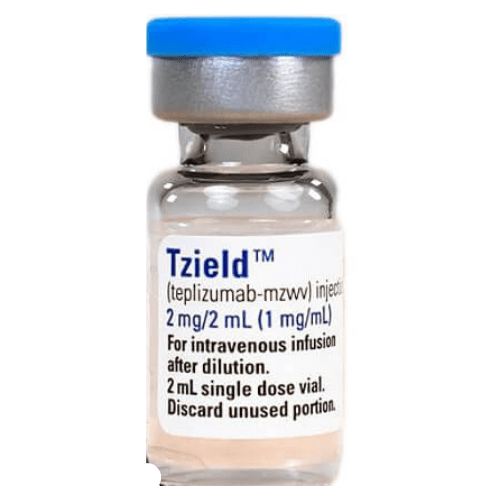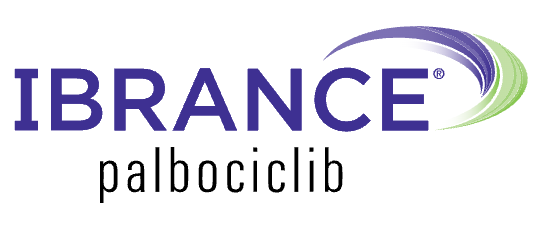Introduction

Tzield (teplizumab-mzwv) is a prescription medication used to delay the onset of stage 3 type 1 diabetes (T1D). Tzield received FDA approval in On November 17, 2022 based on the results of a Phase 3 clinical trial called PROTECT. The trial showed that Tzield significantly delayed the onset of stage 3 T1D in adults and pediatric patients with stage 2 T1D. Tzield is manufactured by Provention Bio, Inc.
Indication
Tzield (teplizumab), a CD3-directed antibody, is prescribed to postpone the initiation of Stage 3 type 1 diabetes (T1D) in individuals, both adults and pediatric patients aged 8 years and older, diagnosed with Stage 2 T1D.
Type 1 diabetes
Type 1 diabetes is a chronic condition in which the pancreas produces little or no insulin. Insulin is a hormone that helps glucose enter the cells in the body to be used as energy. Without insulin, glucose builds up in the bloodstream, leading to high blood sugar levels that can cause serious health problems.
Type 1 diabetes is thought to be caused by an autoimmune reaction in which the body attacks and destroys the cells in the pancreas that produce insulin. This condition can develop at any age, but it is most commonly diagnosed in children and young adults.
Symptoms of type 1 diabetes: Symptoms include increased thirst and urination, increased hunger, blurred vision, and weight loss.
Mechanism of Action
Tzield, a monoclonal antibody, targets T cells in the immune system responsible for attacking and destroying beta cells in the pancreas. These beta cells produce insulin, regulating blood sugar levels. By blocking the activation of these T cells, Tzield preserves beta cell function, delaying the onset of Stage 3 T1D in an autoimmune context.
Dosing Information
1. Diagnosis Confirmation:
To confirm Stage 2 T1D, doctors will check for at least two specific antibodies related to the pancreas in individuals with irregular blood sugar levels but not extremely high levels. This is usually done through a test called an oral glucose tolerance test (OGTT) or an alternative if OGTT isn’t available.
2. Distinguishing from Type 2 Diabetes:
Doctors will also make sure that your personal health history doesn’t suggest Type 2 diabetes, which is a different kind of diabetes.
3. Health Check Before Starting Tzield:
Before beginning Tzield treatment, your doctor will perform routine blood tests to ensure your overall health, focusing on your blood count and liver enzymes. If certain lab results are not normal, Tzield may not be recommended.
4. Preparing and Administering Tzield:
Tzield is mixed with a specific solution and given through a vein. Your doctor will provide detailed instructions on how to prepare and administer Tzield, typically using a diluted solution with 0.9% Sodium Chloride Injection, USP.
5. Preventive Medications:
Before each Tzield dose, your doctor may recommend taking medications to prevent potential side effects. These medications include a pain reliever like acetaminophen or a nonsteroidal anti-inflammatory drug (NSAID), an antihistamine, and/or an anti-nausea medication.
6. Treatment Schedule:
Tzield injection is administered through an intravenous (IV) infusion, which means it’s delivered through a vein. This process takes at least 30 minutes and occurs once a day for 14 days. Your doctor will provide you with a schedule to follow for your treatment.
Warnings and Precautions
Severe allergic reactions:
- Acute hypersensitivity reactions, e.g., serum sickness and bronchospasm, surfaced in Tzield-treated patients. Promptly discontinue Tzield for severe reactions.
- Some people may have a severe allergic reaction to Tzield. Symptoms of an allergic reaction can include rash, itching, swelling of the face, throat, or tongue, trouble breathing, and dizziness.
Cytokine Release Syndrome (CRS)
- In Tzield-treated patients, CRS manifested in 5%, differing from 0.8% in controls. Symptoms included fever, nausea, fatigue, headache, myalgia, arthralgia, and elevated liver enzymes.
- CRS mitigation involves premedication and monitoring; discontinue Tzield for severe cases.
Serious Infections
- Tzield patients exhibited a 3.5% serious infection rate versus 2% in controls, spanning gastroenteritis, cellulitis, pneumonia, abscess, and sepsis.
- Avoid Tzield in active serious or chronic infections.
- Tzield can weaken the immune system, which can increase the risk of infection. People taking Tzield should be closely monitored for signs of infection.
Lymphopenia
- Tzield may increase the risk of certain types of cancer, such as lymphoma and leukemia.
- Lymphopenia occurred in 78% of Tzield-treated patients, recovering post-day five.
- Severe cases prompted discontinuation in 0.5%. Monitor and discontinue Tzield for prolonged severe lymphopenia.
Vaccinations
- Safety of live-attenuated vaccines in Tzield-treated patients is unexplored.
- Administer age-appropriate vaccinations before Tzield. Avoid inactivated/mRNA vaccines 2 weeks before, during, or 6 weeks after Tzield.
- For live-attenuated vaccines, avoid 8 weeks before, during, or up to 52 weeks post-Tzield treatment.
Use in Pregnancy and Breastfeeding
Pregnancy:
Caution is advised regarding Tzield insulin injection use during pregnancy, as it may pose a risk of fetal harm. Decision-making should involve a thorough risk-benefit assessment by consulting with a healthcare provider. Tzield should only be employed during pregnancy if the potential benefits are deemed to outweigh the potential risks to the fetus.
Lactation:
For lactating individuals, the consideration of pumping and discarding breast milk during and for 20 days post-Tzield administration is recommended. The passage of Tzield into breast milk is uncertain, necessitating caution. Before using Tzield while breastfeeding, consultation with a healthcare provider is advised.
Use in Pediatric and Geriatric
Pediatric:
The safety and efficacy of Tzield injection in delaying the onset of Stage 3 type 1 diabetes have been established in pediatric patients aged 8 years and older with Stage 2 type 1 diabetes. Supporting evidence is derived from a well-controlled study (Study TN-10) in adults and pediatric patients aged 8 years and older. However, the safety and effectiveness of Tzield have not been established in pediatric patients below 8 years of age.
Geriatric:
There is no specific information about the safety and efficacy of Tzield in geriatric patients. Stage 2 type 1 diabetes primarily affects pediatric and younger adult patients, clinical studies investigating Tzield’s efficacy in delaying the onset of Stage 3 T1D did not include individuals aged 65 years and older.
Use in Patients with Renal Impairment
There is no specific information about the safety and efficacy of Tzield in patients with renal impairment.
Use in Patients with Hepatic Impairment
There is no specific information about the safety and efficacy of Tzield diabetes drug in patients with hepatic impairment.
Side Effects
The most common side effects of Tzield include:
- Upper respiratory tract infection
- Headache
- Nasopharyngitis
- Pyrexia
- Diarrhea
- Cough
- Abdominal pain
Storage of Tzield Vials
Tzield vials should be refrigerated at temperatures between 2°C to 8°C (36°F to 46°F) within the original carton to safeguard against light exposure. Ensure the vials are stored upright. Avoid freezing or shaking the vials.
Diluted Tzield
In the event that the diluted solution is not used immediately, it should be stored at room temperature, specifically between 15°C to 30°C (59°F to 86°F). The complete infusion process should be finalized within 4 hours from the start of preparation. If the diluted solution is not administered within this time frame, it should be promptly discarded.
How To Buy Tzield Online?
Individuals seeking Tzield may need to explore importing the medication, navigating complex regulations. Sansfro, a specialized pharmaceutical procurement company, is prepared to assist in the importation process, providing genuine pricing.
For information on Tzield injection price in India and the importing procedure, contact the Patient Support Team at (+91) 9315705373 or via email at help@sansfro.com. Sansfro Health is dedicated to facilitating the medication importation and ensuring genuine pricing information. Additionally, you can explore the option to buy Tzield online through Sansfro’s services.
Conclusion
Tzield is a promising new treatment for stage 2 T1D that has the potential to delay the onset of stage 3 T1D and preserve beta cell function. However, it is important to note that Tzield can cause serious side effects, and it should only be used under the supervision of a healthcare provider.
Reference



